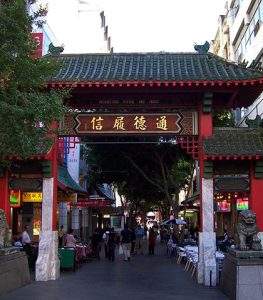Survey of Chinese-Australians a mixed bag
The Chinese community in Australia is feeling less comfortable as the relationship between the two countries becomes more fraught, according to new research from the Lowy Institute.
The latest of the institute’s annual ‘Being Chinese in Australia’ surveys analysed Chinese-Australian sentiment on belonging, trust, strategic competition and COVID.
 It found that most Chinese-Australians identified with both countries and cultures but that the number of Chinese-Australians who feel a sense of belonging to Australia, China and their local community has fallen since 2020.
It found that most Chinese-Australians identified with both countries and cultures but that the number of Chinese-Australians who feel a sense of belonging to Australia, China and their local community has fallen since 2020.
The study also found that although the Chine-based ‘WeChat app remained popular, increasing numbers of Chinese Australians were getting news from Australian media.
“WeChat, the Chinese ‘super-app’ that includes messaging, social media, financial payments and more, has attracted much debate in recent years,” the report said.
“Most Chinese-Australians rely on the app for Chinese-language news (86 per cent) and contact with friends and family (66 per cent). But they are also sceptical of the reliability of news shared on the platform.
“More Chinese-Australians rate Australian media platforms as being fair and accurate (71 per cent) than news shared on WeChat (49 per cent).
“Nevertheless, the majority of Chinese-Australians (57 per cent) say that Australia media coverage of China is “too negative”, an increase of seven per cent since 2020,” the report said.
The Lowy survey also found increasing levels of unease among Chinese-Australians of foreign, including Chinese, influence on Australian politics.
“While Chinese-Australians remain much more trusting of China than the broader Australian population, and have far higher levels of confidence in China’s leader Xi Jinping, Chinese-Australians have become more concerned about foreign interference,” the report said.
“In the latest survey, at least half say that the public, politicians and media are paying “about the right amount of attention” to foreign interference, an increase of more than 20 per cent since 2020.
“Half of the Chinese-Australian population are concerned about foreign influence from China on Australia’s political processes, while 36 per cent are concerned about influence from the United States,” the report said.
The survey found varying opinions among Chinese Australians about approaches to managing COVID-19 and its origins.
“With differing international approaches to managing the COVID-19 pandemic, the majority of Chinese-Australians see countries aiming for COVID-zero as handling the pandemic well,” the report said.
“Amid intense global speculation and outright disinformation, the survey also reveals significant uncertainty and divided opinions among the Chinese-Australian community as to the origins of the pandemic, with 31 per cent saying they are unsure, 27 per cent saying the virus originated in a lab leak in the United States, 15 per cent saying a lab leak in China,” the report said.
Only 21 per cent of survey respondents believe that the most likely cause of the COVID-19 pandemic was from human contact with an infected animal in China.
The survey found that a majority of Chinese-Australians see China as ‘more of an economic partner to Australia’, in contrast to the broader Australian population which sees China as ‘more of a security threat’.
But Chinese-Australians are less optimistic than other Australians about Australia’s position in great power competition, with only 53 per cent saying it is possible for Australia to have a good relationship with China and United States at the same time, compared to 72 per cent of the broader population who hold this view.
Australia is home to more than 1.2 million Chinese-Australians, about five per cent of the Australian population. Many were born in Australia, with lineages that span generations of Australian history. Others have migrated more recently from China, Hong Kong, Taiwan and Southeast Asia.
Read more here: Five key findings from the Being Chinese in Australia survey (lowyinstitute.org)












